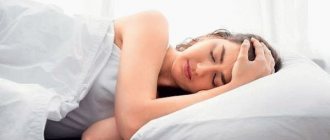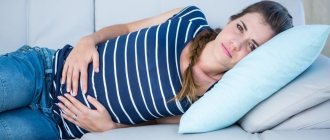Women who experience weakness during menstruation, for the most part, consider this condition to be normal. But this opinion is wrong - malaise is often associated with PMS, a drop in hemoglobin levels, and other disorders. It is possible to get rid of painful health in the first days of the menstrual cycle. The first thing you need to do is schedule an examination , based on the results of which the doctor will prescribe treatment or advise methods of correcting the condition using non-drug means.
Why weakness during menstruation
Shortly before the onset of menstrual bleeding and in the first days of a new cycle, sharp hormonal fluctuations occur in the body. With the onset of bleeding, the high level of progesterone drops, and estrogen begins to be actively produced. Such biochemical processes during menstruation in most women are accompanied by only slight weakness, and in some they go unnoticed.
Sometimes the deterioration in health is more pronounced. Ladies complain of attacks of nausea during menstruation, dizziness, fever followed by chills . Sometimes the weakness is so strong that there is no strength to work, you want to lie down. This condition cannot be ignored. The causes of poor health may be severe premenstrual syndrome with vegetative-vascular manifestations, as well as significant blood loss during menstruation and the associated decrease in hemoglobin levels.
The woman’s condition returns to normal already on the 3-4th day of the new cycle. But weakness after menstruation should alert you. It often occurs against the background of inflammatory processes and metabolic disorders.
Why do you want to sleep?
Neurological, environmental and hormonal factors are responsible for the process of falling asleep and the quality of rest.
They depend on age, environment, daily routine, nutrition, and functioning of the central nervous system. But an adult, as a rule, does not need to rest, for example, as much as a kitten should sleep, that is, more than 9 hours. The menstrual cycle is divided into 4 phases:
- beginning (critical days);
- follicular (period for the formation of a mature egg);
- ovulation;
- luteal (readiness of reproductive organs for conception and pregnancy).
It is in phase 4 that the jump in hormones, PMS, is noticeably manifested, the need to sleep increases, since in the absence of fertilization, the corpus luteum with the egg dies, and the reproductive system is reconfigured for a new cycle.
The predominance of progesterone over the group of estrogens in a woman causes a feeling of constant fatigue and emotional instability. The desire to sleep, weakness, conflict, high fatigue before critical days (CD) occurs every month with a psychovegetative or mixed form of premenstrual syndrome. Lethargy or poor health can also affect the beginning of the cycle.
Weakness manifests itself both with heavy discharge and with poor blood circulation. It is recommended to take a general blood test and consult a cardiologist to rule out pathologies of the cardiovascular system and anemia.
The last reason for wanting to sleep longer is considered to be poor quality of rest. This happens against the background of worries due to the leakage of discharge beyond the pad, sensitivity to irritants: hunger or thirst, light, noise, the TV on. By excluding them, a woman gets better sleep.
There is a set of measures to protect yourself from the unpleasant manifestations of premenstrual syndrome. Temporary changes in diet, extended night rest, and physical activity in the form of gymnastics will reduce the desire to sleep.
Throughout the entire cycle, it is recommended to drink at least 1.5 liters of still water per day. To eliminate the desire to sleep for a long time, a week before menstruation and until the end of the period, they consume several types of fermented milk products a day: yogurt, cottage cheese, sour cream, yogurt. In addition, they eat salads from raw vegetables, buckwheat porridge, boiled beets, wholemeal bread, sea fish, and flaxseed oil. This will help saturate the body with calcium, the loss of which increases at the beginning of the cycle, and avoid pain in the lower abdomen.
To reduce the desire to sleep for a long time, it is recommended to consume the following foods and drinks:
- rosehip decoction;
- herbal tea (linden, chamomile, lemon balm);
- non-concentrated freshly squeezed juices;
- apples;
- bananas;
- citrus;
- dried fruits;
- nuts.
Such a diet will replenish the supply of vitamins, iron and magnesium, increase energy, support the immune system and nervous system during periods of hormonal fluctuations. It is advisable to reduce the amount of fried, smoked, salty and spicy foods in your food. Due to overeating of these foods, fluid is retained in the tissues, swelling, rashes, and the need to sleep longer appear.
For complex manifestations of PMS and estrogen deficiency, doctors use complex treatment. If there is a forced need to sleep for a long time, hormonal drugs are prescribed (Utrozhestan, Logest and others). In most clinical cases, Magne-6 and sedatives (Seduxen, Tsipramine and others) are taken.
To avoid such inconveniences, it is recommended to use tampons, fabric or disposable pads of elongated shape from the “Super”, “Maxi” series, and silicone menstrual guards (cups). With the right hygiene product during menstruation, you can sleep in any position and have a good rest at night, without worrying about blood leaking onto the sheets and linens.
Eliminates the desire to sleep by walking in the fresh air, warming up, and breathing exercises. It is recommended to do several exercises: walking in place, swinging your arms and legs in circles, bending your torso. They will help disperse blood through the veins and saturate the tissues with oxygen. Menstruation should become an obstacle only to strength training and abdominal exercises, but not to exercise.
The nervous system, hormonal balance and environmental factors are responsible for quality rest during sleep. Sleep can be affected by a woman’s age, environment, diet and daily routine, and the state of the central nervous system. However, it is not typical for an adult to constantly want to sleep and rest for a long period, with the exception of women who want to sleep before menstruation. During this period, the girl may constantly feel lack of sleep, as serious processes are occurring in her body.
The menstrual cycle is divided into 4 main phases:
- initial;
- follicular;
- ovulation;
- luteal
During the last phase, there is a serious hormonal imbalance, PMS symptoms and an increased desire to sleep are common. The reason for this condition is the lack of fertilization, due to which the egg dies and reconstruction to a new cycle begins.
The predominant progesterones in the body cause regular drowsiness, fatigue, and emotional instability. Also, such symptoms are observed during and before menstruation due to a psychovegetative, mixed form of PMS or a decrease in hemoglobin levels. Deterioration in health may occur several days after the end of menstruation.
Drowsiness may occur when there is poor circulation. To exclude pathologies of the cardiovascular system, you need to undergo tests and consult with a cardiologist. Also, the causes of fatigue include poor quality of rest, against the background of increased anxiety, irritability, sensitivity to external stimuli in the form of:
- food;
- thirst;
- Sveta;
- noise;
- TV.
Premenstrual syndrome and weakness
2-7 days before the start of menstruation and in the first 2 days of bleeding, premenstrual syndrome (PMS) occurs. This is a set of symptoms that significantly worsen a woman’s well-being.
Weakness before and during menstruation in women suffering from PMS is associated with the cephalgic or crisis form of the disorder . In the first case, girls feel dizzy and experience pain.
Other manifestations of the cephalgic form of PMS are also possible:
- attacks of nausea, vomiting;
- excessive sensitivity to strong odors, loud sounds;
- rapid mood changes;
- increased sweating;
- painful, hardened mammary glands;
- numbness of the upper extremities.
With this form of premenstrual syndrome, the headache appears in the temple area, has a pulsating character, and exhausts the woman. The cephalgic type of PMS is especially common in young girls and young people, less often in women over 35 years of age. 20% of all cases of PMS occur in this form of the disease.
The crisis form of premenstrual syndrome is accompanied by sudden changes in pressure. During surges in blood pressure, there is a fear of dying, arms and legs go numb, and women feel tightness in the chest . Crises occur mainly at night, and their end is accompanied by the passage of a large volume of urine. The reasons for this manifestation of PMS are prolonged stress, severe physical fatigue, and recent infections. The crisis form of PMS occurs more often in older women (13-20% of cases) than in younger women (4%).
The reason why a girl experiences weakness during menstruation may also be atypical forms of PMS. Hyperthermic is manifested by an increase in body temperature before and a decrease after the onset of menstruation . Hypersomnia causes drowsiness in women.
Causes of sleepiness before menstruation
Before menstruation, a number of changes occur in the body. Hormone levels change. Women are often interested in why they want to sleep before their period. Typically, this symptom is due to the course of premenstrual syndrome. In addition, a woman’s appetite increases. A craving for confectionery products appears.
Symptoms indicate the body is preparing for a new menstrual cycle. Usually the signs disappear after the start of menstruation. If your health worsens due to fluctuations in hormones, it is better to give preference to rest. It is better to reduce physical activity. It is also necessary to exclude the influence of stressful situations.
Many people feel sleepy before menstruation
How do hormonal changes affect
Often, drowsiness is the result of premenstrual hormonal changes. This process is not pathological. In this way, the body prepares for the detachment of the endometrium and the preparation of a new egg, which can later be fertilized.
It is in the second half of the cycle that estrogen production decreases.
It is for this reason that the following symptoms occur:
- weakness;
- skin rashes;
- decreased performance;
- constant desire to sleep;
- deterioration of the hair and nail plates;
- sleep disturbance;
- dizziness;
- frequent mood swings;
- aggressiveness and irritability;
- tearfulness.
There may be skin rashes before your period
The menstrual cycle is cyclical. The main stages of the female period are described in the table.
| Follicular phase | Begins on the first day of menstruation. Characterized by the maturation of the follicle and the preparation of the egg. Lasts at least 10 days. |
| Ovulatory | Characterized by the release of a prepared egg. The period of fertility begins. It is at this time that fertilization is likely. The egg remains active for about a day. If fertilization does not occur, the cell will die and be released along with menstruation. |
| Luteal | If fertilization does not take place, the body prepares for the upcoming onset of menstruation. Premenstrual syndrome appears. |
When ovulating, a woman feels good. Performance is increased and libido is enhanced. In addition, there is a great mood. A characteristic sparkle appears in the eyes.
As soon as the egg dies. Estrogen, which is responsible for female beauty, ceases to be produced normally. The level of the hormone decreases and this is what provokes a sharp deterioration in well-being and the appearance of a number of negative signs.
When ovulation occurs, hormones are released
It is rare that a woman’s body does not react to hormonal changes. Most women have a pronounced premenstrual period. I constantly want to go to bed, no matter how long the girl has slept.
Can uterine changes cause drowsiness?
The female body has a well-established functioning. All processes are clearly cyclical. It is in the second half of the cycle that the female body is aimed at preparing for fertilization and possible pregnancy. This can explain the following symptoms:
- increased appetite;
- rapid weight gain;
- the appearance of swelling;
- increased sensitivity of the mammary gland.
If the egg remains unfertilized, the body changes its goals and begins to prepare for endometrial rejection. The uterus begins to rapidly contract.
Painful cramps occur in the abdomen, which can radiate to the lumbar region. You may need to take painkillers.
Additionally, nausea, paleness of the skin, dizziness, drowsiness and obvious weakness occur. Body temperature decreases.
Nausea is also observed during this period.
How do vitamins and minerals affect
The cause of drowsiness may be a lack of vitamin and mineral complexes. In this case, women who eat poorly or adhere to monotonous diets are most susceptible to the appearance of symptoms.
Ailments shortly before menstruation may be due to a lack of:
- calcium;
- magnesium;
- sodium;
- gland;
- potassium
Deficiency of ascorbic acid and vitamin A can also become a provoking factor. The body reacts to a lack of necessary substances. It is for this reason that a sudden craving for sweet, fatty, salty, etc. may arise.
The diet should contain minerals and vitamins
To prevent drowsiness due to a lack of vitamins and microelements, you should consume complex medications 7 days before menstruation that will help fill the existing deficiency.
Only proper nutrition and taking certain medications will help prevent health problems, including overcoming the desire to sleep.
Could pregnancy be present?
When drowsiness appears for the first time, you need to think about the possible presence of pregnancy. If a delay occurs, be sure to do a rapid test. In addition to weakness, the following signs are also observed after successful fertilization:
- nausea;
- urge to vomit;
- excessive fatigue, regardless of the amount of work performed;
- increased appetite;
- irritability;
- frequent mood changes.
Increased appetite may be a sign of pregnancy
Usually the desire to sleep is present only in the first few months. This symptom is explained by an increase in progesterone levels. After pregnancy, the female body begins to rebuild. The body gets used to the new state and directs all its strength to preserving the child.
The female body begins to need extra sleep. The muscle layer of the uterus relaxes. The resulting weakness is a normal symptom that is diagnosed in at least 80% of pregnant women. After fertilization, you need to reconsider your lifestyle and, if possible, add daytime sleep.
How to get rid of a symptom
If you follow certain recommendations, you can significantly reduce the likelihood of drowsiness. Doctors recommend temporarily changing your diet, getting more rest and giving preference to exercise.
From this video you will learn about the main causes of drowsiness:
Every day you need to drink about 2 liters of clean water. A week before the upcoming critical days, consume as much fermented milk products as possible. Add fresh fruits and vegetables to your menu.
Contact your doctor who will select the most suitable vitamin complexes. Start every morning with light exercise. Before going to bed, give preference to walking.
Source: https://mesyachnie.com/informacija/zhelanie-spat.html
Decreased hemoglobin levels during menstruation
Severe weakness during menstruation can be caused by a decrease in hemoglobin levels. Healthy girls do not experience discomfort associated with blood loss - the female body adapts to it.
The normal hemoglobin level for women is 120-140 g/l. If a deficiency of iron-containing protein occurs before the start of a new cycle, then bleeding will only aggravate poor health . Weakness will also appear if the first days of the cycle are accompanied by heavy bleeding, the volume of loss of biological fluid is more than 200 ml.
- dizziness;
- we feel nauseous;
- bouts of vomiting;
- absent-mindedness,
- headache;
- flashing of flies before the eyes;
- rapid heartbeat;
- lack of air.
How to get rid of weakness during menstruation
You can avoid illness if you know exactly its cause. Women who regularly experience weakness at the end and beginning of their cycle need to be examined.
Ladies who react excessively to PMS need to pay special attention to their diet. Fatty meats, smoked meats, caffeine-containing drinks, and alcohol should be excluded from it. It is recommended to consume fermented milk products with a low percentage of fat, lean meats and poultry, and fatty sea fish (boiled or baked). Fresh vegetable salads, fruits, and juices are useful during menstruation.
Doctors' advice
Feeling impotent a week before your period is not normal. Weakness, especially if it is accompanied by fever, pressure changes, and anemia, should force a woman to seek advice from a gynecologist. The specialist will order an examination, based on the results of which he will make a diagnosis and prescribe treatment.
Women with anemia may need to consult a hematologist. You should contact him if your cycle is short and your periods are heavy. The specialist will prescribe iron supplements to help cope with the ailment.
Sometimes severe weakness occurs due to stagnation of blood that accumulates inside the uterus. The cause of such a disorder may be a tumor, a polyp, a violation of the outflow due to a narrowing of the cervix, or an inflammatory process after an abortion. Treatment for blood stagnation is carried out with medication (oxytocin to stimulate contraction of the uterine walls), blood is sucked out through a catheter, and surgery may be recommended.
Causes of sleepiness during menstruation
The main reasons why you want to sleep during menstruation are:
- Changes in hormone levels. Excessive physiological amounts of progesterone are observed twice during the cycle: on the days of ovulation and during the onset of menstruation. The hormone affects the receptors responsible for sleep, causing lethargy and drowsiness.
- Stress, increased by hormonal fluctuations during this period. Exhaustion of the nervous system also affects physiology. In defense, the body tries to preserve strength, and the reaction is the desire to fall asleep in order to recover.
- Anemia due to menstrual bleeding. A healthy woman normally loses up to 150 ml of blood monthly during menstruation, and even more if there are pathologies. If a healthy balanced diet is not followed, alcohol consumption, smoking and a deficiency of essential microelements, the body does not have time to recover - and the girl wants to sleep. Low hemoglobin levels can appear not only in the first days of menstruation, but throughout the entire cycle.
- Disorders of the cardiovascular system. Women who have low blood pressure may feel weak before and during the first days of their period.
- Pregnancy. It can cause hypersomnia, which worries the girl in the first days of the cycle. For the period of bearing a child, weakness and fatigue are considered the norm, but if dark maroon or brown spotting appears in the early stages, this may indicate a threat of miscarriage.
- Diseases of organs of all systems in any form. Their presence reduces immunity and affects performance and energy. A sluggish state is characteristic in this case not only for the period of menstruation.
Causes of insomnia
All negative symptoms during menstruation are associated with an unstable hormonal state. The amount of testosterone and progesterone in the body decreases, which leads to an unstable psycho-emotional state and depression. Therefore, insomnia before menstruation can occur for completely natural reasons.
If a woman cannot sleep, the cause of this condition may lie in a deficiency of certain types of microelements. First of all, this concerns calcium, which is necessary for the functioning of the whole organism and the stable functioning of the nervous system. Its deficiency can cause PMS - irritability and sleep disturbances.
The same applies to glucose - its amount before menstruation decreases significantly. Glucose ensures the balance between estrogens and progesterones, their penetration from the blood into cells. A deficiency of this substance negatively affects the functions of the nervous system and the process of falling asleep at night.
The main pathological causes that disrupt the process of falling asleep include chronic endometriosis. It provokes hormonal imbalance, delayed periods, and constant inflammation. As a result of the disease, the manifestations of PMS symptoms, including insomnia, intensify.
Drowsiness before menstruation is considered a normal condition for a woman. There are many factors that cause this condition, but if the desire to sleep is accompanied by other negative symptoms, you should consult a doctor.
Slight weakness and malaise may be normal for a healthy woman on the eve of and during menstruation. But the condition is not always associated with increased stress and psycho-emotional stress. This is especially true for the female body. Changes in hormonal levels can be so pronounced that it confuses the fair sex. But you shouldn’t attribute your condition to this alone. Often, weakness during menstruation may indicate serious illness.
Its severity ranges from mild malaise to complete asthenia for several days. Weakness in this condition is part of a complex of symptoms. Along with it, lethargy, headache, nausea or even vomiting, pain in the mammary glands and lower abdomen, irritability, tearfulness, nervous excitability and others appear. Rarely does one woman experience everything at once.
Symptoms of premenstrual syndrome, including weakness, are largely dependent on lifestyle. Insufficient physical activity, poor or excessive nutrition, deficiency of vitamins and microelements in food (especially magnesium, C, A, E), nicotine and alcohol abuse lead to a more vivid clinical picture.
PMS symptoms
Changes in hormone levels throughout the cycle often lead to depression on the eve of and during menstruation. At the same time, sometimes a woman perceives this as weakness: she doesn’t want to do anything, she lacks emotional and physical strength. Gradually the condition passes, and by the middle of the cycle she feels well.
Changes in blood counts are one of the serious reasons why a woman may feel tired and lack of strength. Many people do not even suspect that gynecological pathology sometimes leads to a decrease in hemoglobin levels in the blood. But it cannot be otherwise, because during menstruation a woman normally loses up to 150 ml of blood, and with pathology the figures vary greatly.
| Cause | How it manifests itself |
| Uterine fibroids, especially those with a submucous location of the node or large sizes | As a result, the myometrium cannot fully contract, the area of the internal sloughing layer of the uterus increases, and menstruation becomes very heavy. Sometimes the discharge shows the appearance of lumps - clots similar to parts of the liver. |
| Endometrial pathology (hyperplasia and polyposis) | This condition is characterized by acyclic spotting. |
| Oncological diseases of the cervix and uterine cavity | A woman may not even suspect the presence of a malignant pathology. But progressive weakness and malaise will lead her to a doctor, who, upon examination, will reveal the pathology. |
Malignant ovarian tumors do not lead to bleeding, but there is a sharp decrease in hemoglobin. And hence the general poor health.
In such situations, weakness will be combined with lethargy, increased fatigue, shortness of breath appears even during normal physical activity, the heart rate increases, blood pressure drops, the skin is pale, and there are some other signs.
Often, when the hemoglobin level decreases, a woman notices the appearance of a metallic taste in the mouth and a change in taste preferences.
Pregnancy
If weakness and nausea appear during menstruation, but the woman notes that the discharge is much less than usual, and it is even spotting, pregnancy cannot be ruled out. In this case, menstruation may come on time or with a slight delay. In fact, these are the threat of interruption, not critical days.
Changes in pressure, often called VSD, are more susceptible to women of slight build, who are normally characterized by low blood pressure. On the eve of menstruation and especially during it, girls often notice weakness, which is associated with several reasons:
- loss of blood - fluid volume,
- fluctuations in hormonal levels with a predominance of the gestagenic component, which in itself reduces blood pressure.
Gradually the woman recovers, and the weakness disappears. It is possible to establish that such conditions are associated specifically with pressure drops by monitoring it throughout the entire cycle.
What symptoms may occur during menstruation?
In addition to increased sleepiness, a healthy woman experiences other signs of premenstrual syndrome:
- irritability, frequent mood swings, tearfulness;
- pain in the lower abdomen and mammary glands;
- general deterioration of health, nausea and dizziness.
Each woman experiences symptoms to varying degrees and depends on the characteristics of her body and genetics. According to experts, the healthier a woman’s lifestyle, the less pronounced they are, and vice versa.
How to maintain performance during critical days
The desire to take a nap during the day during menstruation cannot but have a negative impact on performance. To resist it, you can take the following preventive measures:
- eat right - exclude harmful foods, alcohol, cigarettes, coffee, the diet should be based on raw vegetables and fruits in season, vegetable and animal proteins, polyunsaturated fats;
- exercise regularly - physical activity has a positive effect on overall health, including the endocrine system;
- control your emotional state, avoid stress and constantly seek positive experiences;
- Maintain a healthy sleep regime - sleep at least 8 hours a day. This is the main condition for restoring physical strength and psycho-emotional state;
- often spend time in the fresh air.
In order to want to sleep less during the menstrual period, it is necessary, in addition to the listed actions, to find out the exact cause of the ailments and rule out the presence of serious pathologies.
Vitamins for women
To support the condition of the body worsened by critical days, it is recommended to take the vitamins and microelements necessary for women:
- Group B – have a beneficial effect on hormonal levels and contribute to a more comfortable passage of critical days.
- Magnesium – relieves weakness, headaches and pain in the lower abdomen, strengthens the nervous system.
- Polyunsaturated fats - vegetable (from flax seeds) improve hormonal levels, animals strengthen the immune system, improve the condition of the skin and hair.
- Iron – its deficiency is manifested by anemia, weakness and drowsiness.
This is not the entire list; only the main microelements that affect a woman’s condition during menstruation are named. They can be used separately or in combination, most importantly, as prescribed by a doctor after a preliminary examination.
You can alleviate the condition during menstruation and reduce lethargy on your own by changing your lifestyle for the better. Sometimes this requires medication therapy, in particular hormones and vitamins.
Severe, irresistible drowsiness, headache and weakness throughout the body are symptoms experienced by many women during menstruation. It would seem that a completely natural natural mechanism causes so many problems and unpleasant sensations. Why do you want to sleep so much during your period? Maybe this is not normal?
Insomnia before menstruation: causes, methods of combating at home, prevention
Insomnia before menstruation is common. Many women of different ages experience this unpleasant symptom. There are many causes that contribute to this specific condition, each of which must be examined in detail to determine effective treatments.
Premenstrual syndrome - signs and causes
About a week or a few days before the start of menstruation, many women notice some changes in their body, which is completely normal. Some of them experience severe weakness, drowsiness, apathy, and depressive thoughts. For others, the breasts swell and become more sensitive, swelling, dizziness, and headaches appear.
The most common reasons for the development of weakness and drowsiness are:
- A significant change in the level of female sex hormones in the blood. Progesterone and estrogen have a particular effect on well-being. They promote ovulation and egg maturation. During menstruation and immediately before its onset, progesterone levels drop sharply, which can negatively affect a woman’s well-being.
- Fatigue and lethargy during and before menstruation are explained by a lack of certain minerals in the body, such as calcium. This leads to disruption of the nervous system, convulsions, and severe psycho-emotional states .
- Decreased blood glucose levels due to hormone imbalance.
- Decreased serotonin production, which leads to poor mood and decreased performance.
- Increased concentration in the blood of aldosterone, which is produced by the adrenal glands. This causes swelling, disruption of the heart and changes in blood pressure.
The connection between PMS and insomnia
Very often, insomnia occurs during menstruation approximately 5-8 days in advance. This is associated with changes in hormonal levels, which affect the functioning of the entire body. This negative impact especially affects the functioning of the cardiovascular and nervous systems. Such disorders are manifested by deterioration of well-being, severe psycho-emotional state and sleep problems.
Constant lack of sleep during PMS aggravates nervousness and causes decreased performance.
Another harmful factor leading to chronic insomnia is a lack of nutrients. A woman’s body reacts especially acutely to a deficiency of serotonin, calcium, glucose, various amino acids and vitamins. This condition disrupts the normal transmission of nerve impulses to the brain, which negatively affects a person’s emotional state and disrupts his sleep.
How to get good sleep back
Treatment for insomnia caused by PMS can occur in different ways. It all depends on the well-being and general condition of the woman, the presence of concomitant diseases.
Traditional medicine
There are many effective medications that help normalize sleep and get rid of neuroses:
- Sedatives (tincture of valerian, motherwort, Sedasen, Novopassit). They have a calming effect on the nervous system, which helps you fall asleep without problems and relieves psychological stress.
- Tranquilizers, antidepressants. These are very powerful drugs that are prescribed in extreme cases when easier drugs do not give a positive result. Such treatment can only be recommended by a doctor, since it is accompanied by significant risks due to the high likelihood of developing side effects. The duration of the course and acceptable dosages are determined only by a specialist, based on the patient’s condition .
- NPS (Ibuprofen). Prescribed to combat headaches and migraines, which often cause poor sleep.
- Diuretics. Designed to remove excess fluid from the body, which often creates problems with falling asleep.
- Hormonal therapy. If serious disturbances in the functioning of the nervous system are detected, artificial substitutes for female hormones are prescribed. Such therapy is rarely used due to the large number of side effects.
Traditional treatment
There are many effective traditional medicine recipes that have a positive effect on a woman’s well-being before the onset of menstruation and normalize sleep.
The most popular of them:
- Aromatherapy. It is recommended to place a napkin on the table near the bed, where you need to drop a little lavender oil. It calms the nervous system, which will help you fall asleep easier.
- Herbal teas. Drinks based on mint, lemon balm, and chamomile are especially useful. It is not advisable to add sugar to them. It is best to use natural honey. Disposable pharmacy filter bags are suitable for making tea.
- Milk with honey. Before going to bed, it is recommended to drink a glass of this drink .
- Herbal collection. An infusion of a mixture of components such as valerian root, mistletoe leaves, dandelion and oregano has a positive effect on a woman’s condition during the onset of PMS. They are used in a ratio of 1:3:4:5. A teaspoon of the mixture is poured with 210 ml of boiling water. After 15 minutes, drink the infusion, adding a little honey.
Prevention
To prevent the development of insomnia before the onset of menstruation, you must follow simple rules:
- Regular physical activity. Depending on your health and desire, you can sign up for a gym, swimming pool, aerobics, or just jog or walk every day. Physical activity promotes the production of endorphins, which improves mood and prevents the development of stress.
- Daily routine and enough sleep. You need to get enough sleep all month, which allows you to always feel cheerful. It is recommended to go to bed and get up at the same time. In this case, the body will develop its own biorhythms.
- Proper nutrition. To normalize the activity of the nervous system, shortly before menstruation, it is advisable to give up excessively fatty, sweet foods, alcohol, coffee and tea . It is recommended to eat often, but in small portions, and eat a lot of vegetables and fruits.
- During the period of exacerbation of all PMS symptoms, it is recommended to enrich your diet with vitamins and minerals. It is advisable to use products containing magnesium, calcium, iron, vitamins B6 and C.
Following fairly simple recommendations will help maintain good health and normalize sleep during any period of the menstrual cycle. But if pathologies appear, you need to consult a doctor who will prescribe the optimal treatment.
Source: https://faza-sna.com/narusheniya/pered-mesyachnymi
Who is to blame for drowsiness?
Have you noticed that with any ailment, be it a cold or menstruation, the body’s first reaction is fatigue, lethargy, and drowsiness? In this way, he tries to protect himself from external loads and save strength to eliminate the “breakdown.” Let's look at what reasons can cause bouts of drowsiness on the eve of menstruation.
Progesterone
The menstrual cycle is regulated by the hormones estrogen and progesterone. Fluctuations in hormonal levels greatly affect the condition as a whole. In the middle of the cycle, their level increases, the woman feels in high spirits. Towards the end of the cycle, hormone levels decrease, so sensitive individuals may feel a loss of strength, irritation and a strong desire to get a good night's sleep.
Hemoglobin
No matter how natural a process menstruation is considered, blood loss still affects our well-being. During normal discharge, about 150 ml of blood is lost. And if a woman suffers from diseases of the reproductive system, blood loss can be much higher. As a result, many menstruating people suffer from anemia - reduced hemoglobin syndrome.
Note! Anemia can be recognized by the following signs: weakness in the legs, constant drowsiness, pale complexion, metallic taste in the mouth.
Depression
A woman may not suspect that she is depressed, especially if she is bogged down in worries and household chores. And before menstruation, the condition intensifies against the background of blood loss and “jumping” hormones. Depression is emotionally and physically draining. You don’t want to do anything, apathy and drowsiness set in, and the meaning of life is lost.
Why do women sometimes want to sleep so badly?
Women's hormonal levels are unstable, so they are more likely to experience drowsiness than men. Disruption of the interaction and relationship of hormones occurs during the menstrual cycle, pregnancy, and menopause. Hormonal shocks affect physical and mental health. Women complain of constant fatigue and drowsiness before childbirth, during menopause, and during menstruation.
Why do hormonal fluctuations during menstruation cause drowsiness?
Normal levels of the sex hormones estrogen and progesterone are important for the functioning of the female body. During the menstrual cycle, hormonal balance is disrupted. During menstruation, the secretion of estrogen and progesterone decreases.
Insufficient production of hormones causes apathy, nervousness, and increased drowsiness. After menstruation, estrogen levels increase again and reach a peak in the middle of the menstrual cycle.
The amount of progesterone increases to its maximum at the time of ovulation.
Progesterone acts on the receptors responsible for sleep and provokes a constant or periodic desire to sleep. A few days after ovulation, progesterone secretion begins to gradually decrease.
In the second half of the cycle, the female body produces more estrogens, which promote good mood, endurance, and performance. Estrogen levels decrease before menstruation.
During this period, women who are sensitive to hormonal fluctuations may experience weakness and drowsiness, irritation, and mood swings.
Blood loss during menstruation can cause mild anemia, which causes fatigue and drowsiness. Such hormonal fluctuations are considered normal.
But often the amount of progesterone and estrogen rises or falls regardless of the menstrual cycle.
In such cases, hypersomnia indicates the development of diseases of the thyroid gland, tumors of the adrenal glands and testicles.
Drowsiness during menopause
By the age of forty, women's levels of sex hormones gradually begin to decline. Estrogen deficiency causes hot flashes and night sweats, which lead to awakening. With a lack of the hormone, magnesium absorption is reduced, which can cause restless legs syndrome and muscle spasms.
Age-related estrogen deficiency negatively affects the psycho-emotional mood, the condition of the heart and blood vessels, and the tone of the bladder muscles. With insufficient progesterone production, falling asleep worsens. All these factors interfere with the quality of sleep.
Nighttime insomnia during menopause is replaced by daytime increased sleepiness, irritability, and bad mood.
Which hormone is to blame for sleepiness in pregnant women?
After ovulation, if fertilization has occurred, progesterone is actively produced. It prepares the female body for bearing a child.
Severe drowsiness during the day, nausea, vomiting, increased fatigue, even before the onset of menstruation, tell a woman that she is expecting a child. The urge to fall asleep during the day is especially strong in the first months.
Often expectant mothers ask the question: “Why does a pregnant woman constantly want to sleep, and how long will this condition last?”
The desire to take a nap and morning sickness are caused by an increase in progesterone levels. Great changes are happening in the female body. All organs must work hard to ensure new life. Therefore, the body needs additional sleep.
In the first trimester, progesterone protects the fetus from rejection. It relaxes the muscular system of the uterus, preparing it for the growth of the fetus. In addition, the hormone reduces the excitability of the cerebral cortex, so there is often a desire to sleep during the day.
When carrying a child, not only the physical stress on the body increases, but also the emotional one, which contributes to fatigue and drowsiness. A periodic desire to fall asleep during the day is a normal state for an expectant mother in the first months of pregnancy.
Under no circumstances should you combat hypersomnia with stimulants.
In the second trimester, the desire to take a nap during the day becomes less noticeable or disappears. But during this period, anemia often becomes the cause of constant drowsiness. Against the background of late toxicosis, hypersomnia may develop, accompanied by nausea, frequent vomiting, increased blood pressure, and edema. In such cases, you need to contact a specialist.
Closer to childbirth, a woman is again accompanied by fatigue and a strong desire to take a nap throughout the day. The condition should not bother the expectant mother, this way the body prepares for hard physical work. To reduce sleepiness, a woman should move more, eat right and sleep more at night. During the daytime, sleep is less efficient and can cause insomnia.
List of used literature:
- Neurology. Handbook of a practicing physician. D. R. Shtulman, O. S. Levin. M. "Medpress", 2008.
- National Institutes of Health. NINDS Hypersomnia Information Page (June 2008). Archived April 6, 2012 (English)
- Poluektov M.G. (ed.) Somnology and sleep medicine. National leadership in memory of A.N. Vein and Ya.I. Levina M.: “Medforum”, 2016.
Source: https://PsySon.ru/bolezni-sna/narkolepsiya/sonlivost-u-zhenshin.html
How to help yourself wake up?
To overcome drowsiness before menstruation, try to understand the reason that provokes the unpleasant condition. Pay attention to whether there are symptoms of bleeding - this is a reason to consult a doctor. If there are no serious illnesses, you can cope with drowsiness on your own.
Some tips on how to get rid of sleepiness these days:
- Try some physical activity to get your blood flowing. Do Pilates or yoga, meditate, walk in the fresh air. The drowsiness that plagues you during your period may be caused by a lack of oxygen.
- Balance your diet, let your diet become more varied and fortified. If you don’t have enough money or time, you can simply take a course of vitamin therapy with drugs.
- Drowsiness and chronic fatigue also occur due to magnesium deficiency. You can take drugs like Magnesia or Magvit. Iron supplements are useful for preventing anemia.
- Quit smoking, or at least reduce the number of cigarettes you smoke per day. Replace coffee with green tea, it has no less caffeine, but more antioxidants.
If drowsiness during menstruation is associated with hormonal levels, ask your gynecologist to prescribe hormonal contraceptives for you. The drug normalizes hormone levels throughout the entire cycle and protects not only from pregnancy, but also from loss of strength.
Causes of drowsiness and insomnia before menstruation
The end of the menstrual cycle has a serious impact on the female body. Drowsiness before menstruation is considered normal. It may occur due to hormonal fluctuations or PMS, and these same factors can provoke swelling, skin rashes, and pain.
Why do you want to sleep?
The nervous system, hormonal balance and environmental factors are responsible for quality rest during sleep. Sleep can be affected by a woman’s age, environment, diet and daily routine, and the state of the central nervous system.
However, it is not typical for an adult to constantly want to sleep and rest for a long period, with the exception of women who want to sleep before menstruation.
During this period, the girl may constantly feel lack of sleep, as serious processes are occurring in her body.
The menstrual cycle is divided into 4 main phases:
- initial;
- follicular;
- ovulation;
- luteal
During the last phase, there is a serious hormonal imbalance, PMS symptoms and an increased desire to sleep are common. The reason for this condition is the lack of fertilization, due to which the egg dies and reconstruction to a new cycle begins.
The predominant progesterones in the body cause regular drowsiness, fatigue, and emotional instability. Also, such symptoms are observed during and before menstruation due to a psychovegetative, mixed form of PMS or a decrease in hemoglobin levels. Deterioration in health may occur several days after the end of menstruation.
Drowsiness may occur when there is poor circulation. To exclude pathologies of the cardiovascular system, you need to undergo tests and consult with a cardiologist. Also, the causes of fatigue include poor quality of rest, against the background of increased anxiety, irritability, sensitivity to external stimuli in the form of:
- food;
- thirst;
- Sveta;
- noise;
- TV.
How to get rid of drowsiness
By adhering to certain rules, the girl will know what to do when drowsiness appears and how to prevent it. To normalize your well-being, you need to change your usual diet, increase your rest time at night, and include moderate physical activity and walks in the fresh air in your daily routine.
The entire menstrual cycle should be accompanied by drinking enough water, about one and a half liters daily.
To avoid drowsiness, you need to include more fermented milk products in your diet 7 days before your period and before it starts.
In addition, a girl’s diet should include vegetable salads, cereals, wholemeal bread, low-fat fish, and vegetable oils. A balanced diet will help saturate the body with the missing substances and vitamins.
It is also better for a woman to give up regular tea. It is better to replace it with decoctions of medicinal herbs. The diet should include various types of nuts, dried fruits and fresh fruits. A properly planned diet will help strengthen the immune and nervous systems, which will have a beneficial effect on well-being during periods of hormonal fluctuations.
By removing fatty, salty, and spicy foods from her diet, the girl will get rid of swelling, skin rashes, and regular drowsiness. In some cases, medications prescribed by a doctor after diagnosis and examination help fight PMS.
Causes of insomnia
All negative symptoms during menstruation are associated with an unstable hormonal state. The amount of testosterone and progesterone in the body decreases, which leads to an unstable psycho-emotional state and depression. Therefore, insomnia before menstruation can occur for completely natural reasons.
If a woman cannot sleep, the cause of this condition may lie in a deficiency of certain types of microelements. First of all, this concerns calcium, which is necessary for the functioning of the whole organism and the stable functioning of the nervous system. Its deficiency can cause PMS - irritability and sleep disturbances.
The same applies to glucose - its amount before menstruation decreases significantly. Glucose ensures the balance between estrogens and progesterones, their penetration from the blood into cells. A deficiency of this substance negatively affects the functions of the nervous system and the process of falling asleep at night.
The main pathological causes that disrupt the process of falling asleep include chronic endometriosis. It provokes hormonal imbalance, delayed periods, and constant inflammation. As a result of the disease, the manifestations of PMS symptoms, including insomnia, intensify.
Drowsiness before menstruation is considered a normal condition for a woman. There are many factors that cause this condition, but if the desire to sleep is accompanied by other negative symptoms, you should consult a doctor.
Source: https://TvoiMesyachnye.ru/obshhie-svedeniya/sonlivost-i-bessonnitsa-pered-mesyachnymi
What vitamins should I take?
To help your body wake up, take a course of vitamin therapy. Your doctor will tell you what vitamins to take if you are extremely sleepy. We will simply discuss the most important vitamins that can be taken during menstruation.
- Vitamin B6 will increase the production of estrogen and improve mood;
- Vitamin E will relieve fatigue and tension, help you sleep peacefully;
- Magnesium will relieve headaches and normalize blood pressure;
- Fish oil will strengthen the immune system and relieve pain in the lower abdomen;
- Iron will restore normal hemoglobin levels in the blood.
Pay close attention to your health. If drowsiness bothers you not only before menstruation, but throughout the entire cycle, perhaps the reason does not lie in menstruation. Attacks of nausea, frequent and sudden dizziness for no reason, chronic insomnia at night and drowsiness during the day are reasons to consult a gynecologist, neurologist and endocrinologist.










